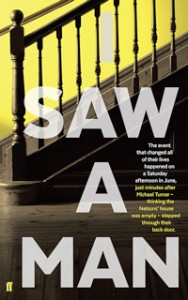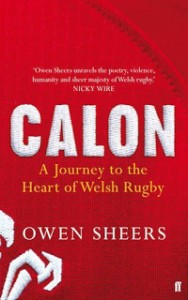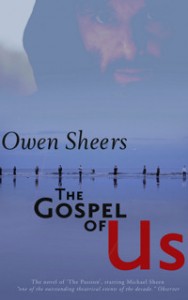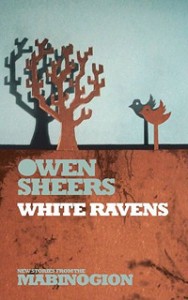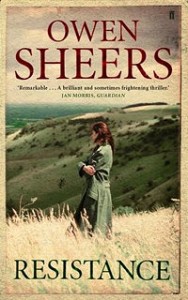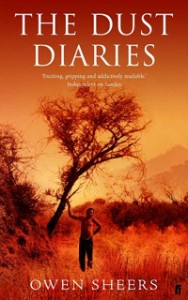 ‘When Owen Sheers discovers a book in his father’s study he stumbles across the life of an obscure relative: Arthur Cripps, lyric poet and maverick missionary to Southern Rhodesia. Compelled by Cripps’ extraordinary life in Africa, Sheers is led on a journey of discovery through contemporary Zimbabwe and into the secrets of the past, in an attempt to understand his ancestor’s devotion to the country and its people.
‘When Owen Sheers discovers a book in his father’s study he stumbles across the life of an obscure relative: Arthur Cripps, lyric poet and maverick missionary to Southern Rhodesia. Compelled by Cripps’ extraordinary life in Africa, Sheers is led on a journey of discovery through contemporary Zimbabwe and into the secrets of the past, in an attempt to understand his ancestor’s devotion to the country and its people.
The incredible story of Cripps’ African legacy, Owen’s travels in his footsteps and the volatile history of a nation are all told in a series of layered, interwoven narratives that distort the boundaries between biography and fiction. Ranging from the dawn of the twentieth century to its close, these narratives come together to explore the nature of love, loss, family and belonging, in a bold and beautifully moving testimony.’
‘A unique achievement written with integrity and great imaginative power’ Michael Holroyd, best books of 2004, The New Statesman
‘A truly wonderful book’ – Doris Lessing.
Reviews:
On the verge Carl Wilkinson, Sunday January 18, 2004. The Observer
Evocative wordsmith who is making the most of his exotic hinterland. more….
The high voltage of belief Saturday January 24, 2004. The Times
The impetuousness, curiosity and zest of the narrator are compelling, says Helen Dunmore
The Dust Diaries Sunday February 1, 2004. The Independent on Sunday
The poet Owen Sheers went to Zimbabwe in pursuit of his missionary kinsman. Cole Moreton follows the trail through a hundred years of forgotten memories
The African King Friday February 6, 2004. The Independent
For his first book of prose, the Welsh poet Owen Sheers has tackled the unfashionable story of a white Anglican missionary – his great-great uncle Arthur – who settled in Southern Rhodesia in the early 20th century. Don’t let that put you off, or you will miss a storyteller with literary nerve and an intelligent insight into the present crisis in Zimbabwe.
Statement by Owen Sheers (August 2011)
RE: The illegal seizure by excommunicated Bishop Nolbert Kunonga of the Arthur Shearly Cripps Shrine in Chivhu, Zimbabwe
In 2004 I published The Dust Diaries, an account of my journey tracing the life and legacy of my great, great uncle, the maverick missionary and activist for African rights Arthur Shearly Cripps. My journey in Cripps’ footsteps finished at his graveside in the knave of a ruined church deep in the Zimbabwean veldt. The church was built by Cripps in the style of Great Zimbabwe. It was midnight and hundreds of people were packed between its walls, dancing and singing around my uncle’s grave. Fires picked out the shape of the kopje that rose above us, testament to the 700 Zimbabweans who had, despite fuel shortages and other difficulties, made the journey to this isolated place to celebrate Arthur’s life and remember his fifty years living and working with the Shona people around Chivhu. The celebrations lasted for three days. Remarkably ecumenical in nature, both Anglican service and traditional Shona pungwe, they constituted the annual ‘Shearly Cripps Festival’, an event attended by Zimbabwean Anglicans for over fifty years.
This year the Shearly Cripps festival has not been allowed to happen. On August 2nd it was reported that excommunicated Anglican Bishop Nolbert Kunonga, an outspoken supporter of President Robert Mugabe and ZANU PF, claimed to have ‘taken over’ the Shearly Cripps Shrine, along with all other church properties in the Masvingo Province. Sadly the local police have enforced Kunonga’s claims, despite repeated court orders ruling access to Anglican properties should be open to all. This claim follows over ten years of similar actions by Kunonga, including inciting violence against those attending services under the direction of the legitimate Archbishop of Harare. As with his actions over the Shearly Cripps Shrine the police, ignoring court orders, have often acted in collusion with Kunonga, even tear-gassing church-goers.
As a descendent of Arthur Shearly Cripps I strongly condemn Kunonga’s illegal seizure of the Shearly Cripps Shrine and all other Anglican Church properties in Masvingo Provience and call upon Kunonga to revoke his false claims. Given the nature of Cripps’ activist work – fighting for indigenous land rights, defending local people against colonial injustice, building the country’s first VD clinic for indigenous Zimbabweans – Kunonga’s actions in denying access to his shrine and inciting violence against the Anglican community are particularly sickening and perverse. Extraordinary though the actions of Kunonga and the police may seem they are also, unfortunately, all too indicative of the cronyism, corruption and injustice that have marred the ZANU PF regime in Zimbabwe for over the last ten years.

